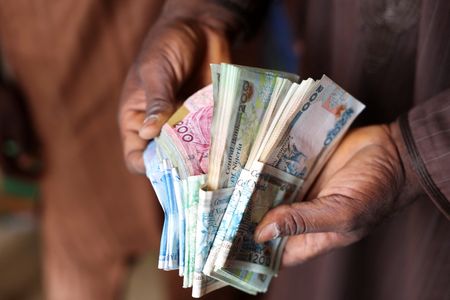By Colleen Goko
JOHANNESBURG (Reuters) -Seismic shifts in global trade and funding have weakened many of Africa’s financial systems in the past year, although there have also been signs of improvements via reforms to foreign exchange regimes and action to help mitigate the impact of climate change, a survey showed on Thursday.
Disruptions to long-standing trade deals, rising tariff uncertainty, and reduced foreign aid to Africa have all triggered sharp asset price movements.
The annual index compiled by pan-African bank Absa and London-based think tank OMFIF showed that while 10 of the 29 countries surveyed recorded improvements, 11 saw declines and eight remained unchanged.
“On a headline basis, the last year may feel like a bit of a disappointment,” Absa Group Chief Executive Kenny Fihla, said.
“But the detail shows that progress continues to be made across the region, particularly in foreign exchange reforms, improved product diversity and action on climate change,” Fihla said.
The report noted growing momentum in climate-aligned finance, with four nations issuing green bonds for the first time. Egypt launched Africa’s first regulated voluntary carbon market, while Ghana implemented climate stress testing for banks.
Bond market activity across the continent thinned during the year, though, with pension fund assets stagnating. Outside of South Africa, Egypt and Uganda, bond trading was particularly subdued due to “tighter liquidity and a cautious approach from investors amid global uncertainties,” according to the report.
Nigeria and Ghana experienced notable declines in secondary bond trading following changes in their foreign exchange markets and debt restructuring. Equity markets outside South Africa and Egypt also struggled, with the equity turnover ratio dropping 11% year-on-year.
South Africa retained its top ranking in the annual index, which evaluates financial market development based on transparency, accessibility, and openness. It was followed by Mauritius and Uganda.
Nigeria slipped one place to fourth despite a major overhaul of its foreign exchange regime, while Namibia came fifth again after introducing a central securities depository. Rwanda climbed three spots to 12th due to new tax treaty agreements.
(Reporting by Colleen Goko. Editing by Marc Jones and Hugh Lawson)








